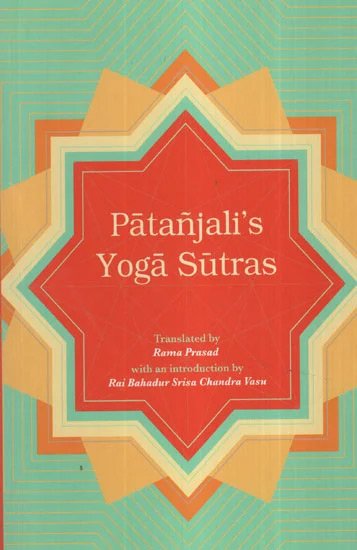Yoga-sutras (with Vyasa and Vachaspati Mishra)
by Rama Prasada | 1924 | 154,800 words | ISBN-10: 9381406863 | ISBN-13: 9789381406861
The Yoga-Sutra 4.24, English translation with Commentaries. The Yoga Sutras are an ancient collection of Sanskrit texts dating from 500 BCE dealing with Yoga and Meditation in four books. It deals with topics such as Samadhi (meditative absorption), Sadhana (Yoga practice), Vibhuti (powers or Siddhis), Kaivaly (isolation) and Moksha (liberation).
Sūtra 4.24
Sanskrit text, Unicode transliteration and English translation of Sūtra 4.24:
तद् असंख्येयवासनाभिश् चित्रम् अपि परार्थं संहत्यकारित्वात् ॥ ४.२४ ॥
tad asaṃkhyeyavāsanābhiś citram api parārthaṃ saṃhatyakāritvāt || 4.24 ||
tad—that. asaṅkhyeya-vāsanābhiḥ—(variegated) by innumerable residua (asaṅkhyeya). cittam—mind, api—also. parārtham—exists for another, saṃhatya-kāritvāt—because it acts by combination.
24. And the mind exists-for-another, also because it is variegated by innumerable residua, inasmuch as it acts by combination.—184.
The Sankhya-pravachana commentary of Vyasa
[English translation of the 7th century commentary by Vyāsa called the Sāṅkhya-pravacana, Vyāsabhāṣya or Yogabhāṣya]
[Sanskrit text for commentary available]
And for what other reason is this the case ? ‘ And it exists for another, also because it is variegated by innumerable residua, inasmuch as it acts by combination.’ This mind is variegated by innumerable residua. It must therefore exist for another, i.e„ for achieving the enjoyment and emancipation of another, not for the achievement of its own object. Because it acts by combination. As a house which has assumed its shape as such, by various materials being brought together, cannot come into existence for itself, so also the mind which assumes a particular shape by more things than one coming together. The mental phenomenon of pleasure does not exist for its own sake ; nor does knowledge exist for itself. On the contrary both these exist for the sake of another. That other is the Puruṣa who has objects to achieve in the shape of enjoyment and emancipation. It cannot be another of the same class. Whatever else the Vaināśika speaks of beyond this as being of the same class, all that must be of the same, class, acting as that also would do by combination. The other however is peculiar to itself and differs from the others in not acting by combination. That is the Puruṣa.—184.
The Gloss of Vachaspati Mishra
[English translation of the 9th century Tattvavaiśāradī by Vācaspatimiśra]
Introduces another reason for believing that the mind is different from the Self : And for what other reason ? ‘And it exists for another, also because it is variegated by innumerable residua, inasmuch- as it acts by combination.’ The meaning of the aphorism is this. Although innumerable residua of action and afflication live in the mind and not in the Puruṣa, and although further, the fruitions depending upon the residua also live in the mind and this fact seems to establish the contention that the mind itself is both the enjoyer and the object of enjoyment existing for the enjoyer, and that everything therefore exists for the mind, still that mind, notwithstanding its being variegated by innumerable residua exists for another. Why? Because it acts by combination. This is the meaning of the aphorism. Explains:—‘The mind, &c.’
Some one may say that although it may be granted that the mind acts by combination, yet notwithstanding this, why should it not be conceived as existing and acting for the sake of itself ? Where is the contradiction in this theory ? Says to him ‘Because it acts by combination.’
‘The mental phenomenon of pleasure.’ These words indicate the experience side of nature and the painful mind is also understood thereby. The knowledge indicates the emancipation side. This is the meaning. The pleasurable and painful minds consisting as they do of similar and opposite impressions are not possible of the Self, because the manifestations in that case would contradict themselves. Nor can anything else acting by combination either directly or indirectly and thus causing pleasure or pain, be either favoured or disfavoured by them. Therefore ho alone who does not operate as pleasure and pain directly or indirectly can either be favoured or disfavoured by them. This can only be the Puruṣa who is always indifferent and who can thus be emancipated. His knowledge too being dependent upon the object of knowledge, and being thus contradictory in its own manifestation, it cannot be said that the knowledge is its own object. For this reason emancipation from external objects becomes impossible, in the same way as is not possible in the case of the Videhas and the Prakṛtilayas. Therefore knowledge also exists for the sake of the Puruṣa, not for the sake of the mind itself.
Nor is the mind in existence for the sake of another of the same kind, because that would mean infinite regression. He therefore for whose sake the mind exists must be the Puruṣa Who does not act by conjunction.—24.
